
How AI is Used in Decision Making?
Manu Jain | September 7, 2024 , 14 min read
Table Of Content
AI is the most famous thing in the world right now. Today, within a few years of ChatGPT going live for the public, its expansion in our daily lives make us believe it’s always been omnipresent with us.
Although the conception started way back in the 20th century, when Czech playwright Karel Capek, in 1921, casually mentioned “Artificial People’ in his fictional play “Rossum’s Universal Robots.” Then in 1949, ‘Giant Brains, or Machines that Think” was published by Edmund Callis Berkley.
The real turning point was when Alan Turing published his famous work “Computer Machinery and Intelligence” (The Turing Test), which proposed The Imitation Game for testing machine’s intelligence. This was a nudge towards the big picture ideation for AI.
The AI word was first used by John McCarthy in a workshop in 1955. A lot happened since then, from Deep Blue beating the World Chess Champion, to NASA landing two rovers on Mars using AI (marking the first time AI based autonomous decision making on another terrestrial planet), to Apple launching its famous Siri as a virtual AI assistant.
This AI expedition has made remarkable contributions, and can truly be called as the AI renaissance, which is now complemented by Big Data, greater computational power, and advances in deep learning.
The strongest forte of AI is its ability to identify patterns across the fields with such a speed which we humans lack. That gives it the magical capability of fast and accurate decision making.
In this blog, we will further discuss how AI is used in decision making in various businesses and its impact on business strategies.
Key Takeaways
- AI enhances decision-making by processing vast datasets with speed and precision, identifying patterns and predicting outcomes.
- Decision Support Systems, Decision Augmentation, and Decision Automation—enable varying levels of AI integration, from assisting human judgment to automating complex decisions.
- Despite its benefits, AI in decision-making faces challenges such as data quality, ethical concerns, bias and interpretability.
- Successful adoption of AI for decisions depends on combining advanced algorithms with human expertise, clear objectives, quality data and industry-specific applications.
What do the stats say?
- What do the stats say?
- What is AI decision Making?
- Types of AI DM Models
- 3 Key Benefits of Using AI in Decision Making
- Challenges of AI in Decision Making
- How does Artificial Intelligence Help in Decision Making?
- Where can AI for decision making be used? Key Industry Use Cases
- Choose ScaleupAlly To Build Intelligent AI Decision Making Systems
- Looking Forward to the Future Impact of AI
- Frequently Asked Questions
- ZipDo Education Reports 2024 says 82% of businesses have a better competitive advantage due to the enabled AI in their setups for decision making.
- It further reveals that 70% of the executives firmly believe that AI will be playing an important role in decision making within the next two years.
- AI increases profitability by 11%, says the report, with a 37% increase in consumer engagement.
- According to Precedence Research, the global decision intelligence market is USD 14 billion this year, and is expected to grow to USD 45.15 billion by 2032, with 15.7% CAGR between 2024 and 2032.
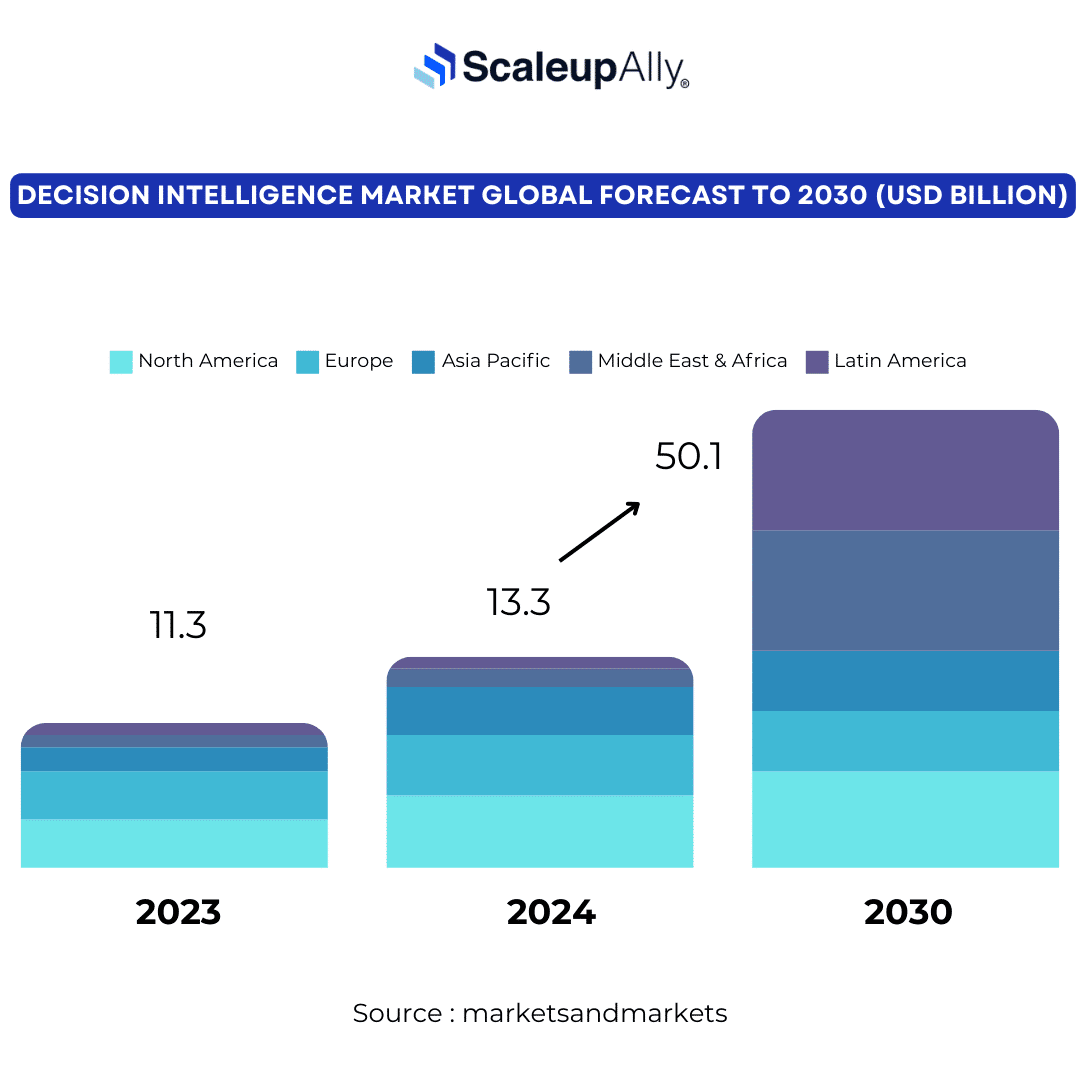
What is an AI?
Artificial Intelligence, a field of science, which is an alternative to natural intelligence. It is a technology which enables machines that can reason, learn the existing patterns, and act. This may almost mimic human intelligence, but speed and scalability is far more scalable than human capacity. The tech requires data, data analytics, object categorization, natural language processing etc.
What is AI decision Making?
In the simplest terms, it is the combining strength of both Artificial Intelligence and Decision Making to plan strategic directives for businesses or any organization to sustain their growth trajectory, and further aim aspirationally higher.
When pattern recognition ability and computational power are taken a level up with techniques like analysis and synthesis that correspond frequently with the natural world to gain perception, understand communication and human actions. It is equipped with adaptability with respect to the changing environment just like the natural world, to find errors and eliminate them for greater accuracy. It can learn and learn better.
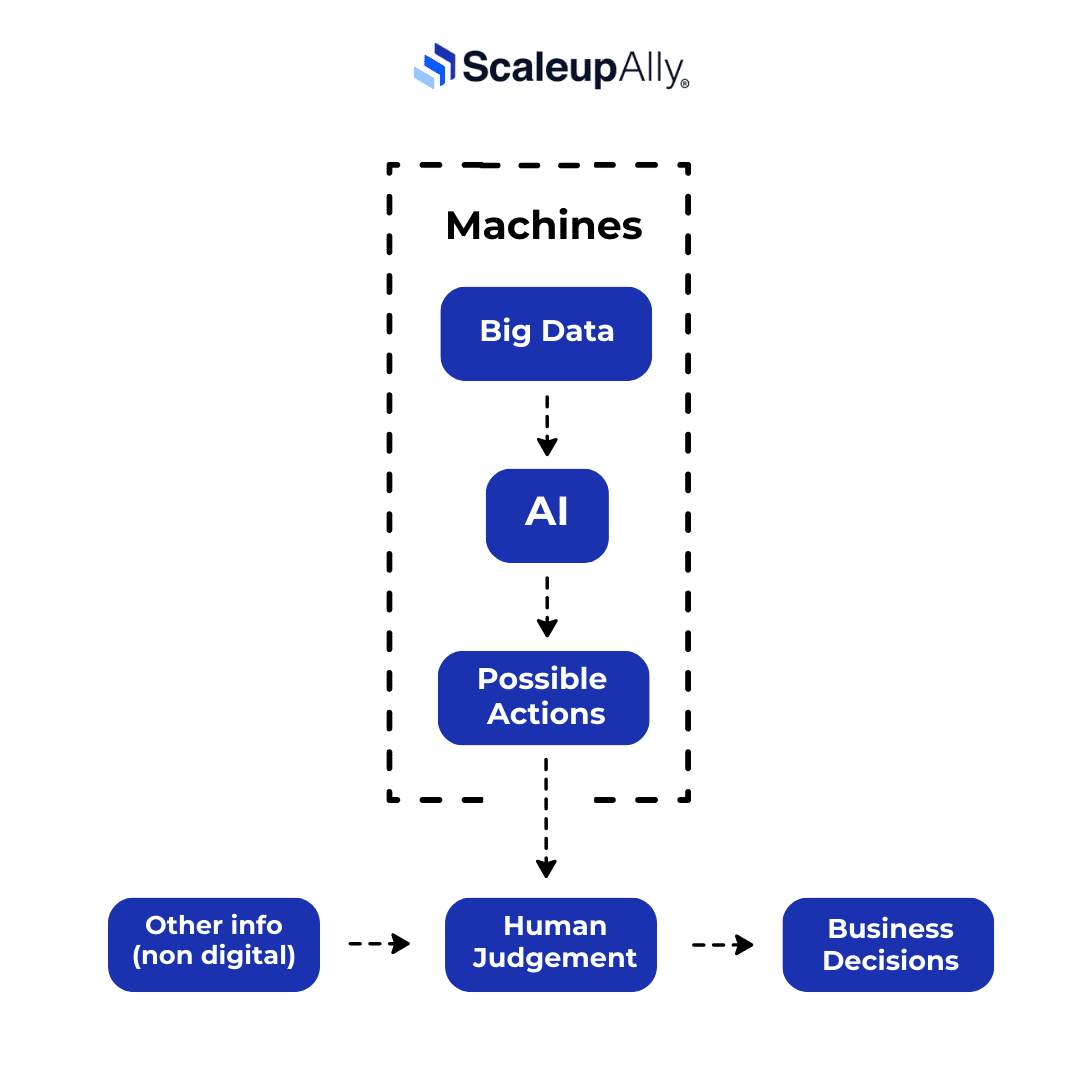
Types of AI DM Models
1. Decision Support Systems
The kind of data we have now, it is impossible for humans alone to segregate and clearly slot them. AI provides fast support where it can review, slot the data, recognise patterns, and factualise the data into informative presentations. While it does the tough task, it paves the way for data decision making where you are in the commanding position with its decision support. For example, it can easily detect leakages in the sales pipeline, which may help one manage the inventory smartly.
2. Decision Augmentation
This system allows human users to do the predictive or prescriptive analysis. Here, the algorithms are monitored for quality by the human user, for accepting, rejecting or modifying the results.
- Predictive Analytics: Forecast future outcomes based on historical data.
- Prescriptive Analytics: Recommend optimal actions based on predictions and constraints.
3. Decision Automation
In this, rules are predefined along with the Decision Augmentation i.e., prescriptive and predictive analytics. This system offers smarter faculties like good speed, scalability, and consistency for decision making application.
- Optimization Models: Find the best solution to a problem with given constraints.
- Recommendation Systems: Suggest items or actions based on user preferences and behavior.
- Risk Assessment Models: Evaluate potential risks and their impact.
3 Key Benefits of Using AI in Decision Making
1. Data Analysis and Insights
The greatest strength of an AI system is its ability to process vast amounts of data, that too with speedy speed and accuracy. Identifying patterns and trends that the human eye might fail to notice. This results in informative and strategic decisions. This is used in market analysis, customer behaviour prediction and risk assessment.
2. Speed and Efficiency
Automation for time consuming tasks helps to make faster decisions, and saves a lot of time. It can analyze complex datasets in real time efficiently. In today’s fast paced industries where time is an equivalent of money because of the pressing importance of right decisions, AI decision making allows the space and time to work on to find the right decision for competitive advantages.
3. Risk Management
Since it can analyze, it is obvious that spotting the risk factors, leakages of any kind comes handy to AI. This saves us from uncertainties and an unanticipated loop of hopeless catch 22.
Challenges of AI in Decision Making
Despite its advantages, the integration of AI in decision-making does not come without challenges. Here are some of these challenges:
1. Data Quality
The effectiveness of AI is heavily dependent on the quality of the data it processes. Poor data quality can lead to inaccurate insights and decisions.
2. Human Oversight
While AI can provide valuable support, it cannot replace human judgment entirely. The best outcomes often result from a collaboration between AI systems and human decision-makers, where human context and experience complement AI’s analytical capabilities.
3. Ethical Concerns
The use of AI raises ethical questions, particularly regarding bias in AI algorithms and the transparency of decision-making processes. Organizations must navigate these issues carefully to ensure responsible AI deployment.
4. Data Bias
Since data is vast, and pattern recognition may fall prey to the unwanted biases in the AI system. Even though AI systems help us prevent human error, over reliance on this would amount to data bias, which only human intervention can rectify.
5. Interpretation
The complexity of its building blocks such as the neural network may hinder the interpretation of it. This lack of explainability causes the black box issues, where trust erodes amongst the users and stakeholders, due to this complex nature. This deepens the susceptibility for poor judgment.
How does Artificial Intelligence Help in Decision Making?
AI decision-making is used through various methods, depending on the business needs and context. Here are some key ways AI is applied:
1. Machine Learning (ML)
ML Algorithms are a class of machine learning algorithms which are trained using past data in order to come up with predictions or classifications. For instance, this applies in finance where ML is used to estimate stock prices or credit risk from big data of market trends and client behaviour.
2. Natural Language Processing (NLP)
NLP enables AI to analyze text, speech or conversation for insights by understanding, interpreting and generating human language. For Example, AI chatbots in customer service use NLP to respond to simple questions, identify customers’ intent and decide on the course of action based on this information.
3. Predictive Analytics
AI models employ the past data to make future events such as sales, equipment failure, or market trends forecasts.
For example in the retail business, it is used to predict the demand of the customers for a particular product so that the merchants do not order large quantities and end up with a lot of unsold stock or order little stock and end up running out of stock, thus cutting down on costs.
4. Optimization Algorithms
These determine optimal solutions for resources, time tables, routes and other organizational activities. For example, AI powered logistics systems can also identify actual delivery routes in real-time depending on traffic conditions or current weather forecasts.
5. Recommendation Systems
The information about the users and their activities are analyzed through AI algorithms so that products, services or contents can berecommended which might interest them.
For example, Netflix has begun utilizing AI to suggest shows and films thematically appropriate to specific viewing histories and user preferences.
6. Computer Vision
AI analyzes visual data, including images or video, to identify objects, patterns recognitions or assess situations. For Instance In manufacturing, AI-based computer vision systems are employed for checking products on assembly lines to find any defects.
7. Data-Driven Insights
The data is processed by AI, which generates insights from large datasets to help guide the strategic moves of a particular organization.
An example in this case would be advertising agencies utilizing these digital tools in their attempts at reaching out to potential clients with targeted advertisements for certain products during a period when people are most likely to buy them.
8. Sentiment Analysis
With this, businesses evaluate certain opinions expressed within textual material like online comments or reviews left by customers on social media sites for decision-making purposes about what products or services they should promote or keep off the market completely.
For instance, Brands employ artificial intelligence scattered across several platforms such as Twitter, this enables them not only to take action but also react instantly as soon as there are any negative shifts taking place about their products online as well as capitalize on good remarks received from users of the product.
Where can AI for decision making be used? Key Industry Use Cases
- Marketing: Companies such as Salesforce use AI to gain insights into consumer behavior that allow them to forecast sales trends and respond quickly to market changes. By analyzing consumer behavior and automating bidding strategies, AI optimizes ad campaigns by improving return on investment for marketers.
- Manufacturing: Predictive maintenance driven by AI anticipates when machinery will break down through sensor data analysis, thereby preventing downtime and maintenance costs.
- Supply Chain Management: AI predicts demand trends and optimizes inventory management, ensuring timely restocking and reducing waste for companies.
- Finance: The major uses include controlling fraud, for instance credit scoring through customer data and transaction patterns can determine whether a loan ought to be approved or not. Fraud detection systems developed using artificial intelligence analyze transaction behavior patterns that are considered to be unusual so that banks avoid losing money through them. For instance abnormal payments are halted before they are processed. This would prevent losses for both the bank and customer. The amount of money spent on AI is naught compared to the cost incurred during financial fraud.
- Healthcare: AI in healthcare is another area where it has registered remarkable success stories mainly because of its unique ability to perform an intelligent analysis independent of human involvement. The most significant where AI has been successful in diagnosis include locating tumors through photographic images taken by a scanner.
- Retail: The main task of our marketing team is developing strategies to utilize artificial intelligence effectively when it comes to customer service as well as sales generation techniques used by online retailers selling things like clothes, electronics etc. Online merchants such as Amazon personalize their products according to what customers usually search for on their sites so as to get higher revenues.
- Autonomous Vehicles: For enhanced road safety purposes, including autonomous vehicles are equipped with AI which enables them to navigate their way in real time while at the same time making sure that they do not hit anything on the road nor are caught by speed limits. These cars are also supposed to follow traffic rules just like any other motor vehicle would do if driven by a person.
- Human Resources: By analyzing resumes and examining the qualifications of job seekers including details such as their previous performance records, AI helps modernize recruitment processes. So far no AI tool has been found that can replace all aspects of this process from beginning to end.
Choose ScaleupAlly To Build Intelligent AI Decision Making Systems
From business intelligence, to smart AI plugins, to AI driven automation, we at ScaleupAlly offer various Artificial Intelligence decision making solutions for businesses of all sizes. We have extensive experience in making businesses more intelligent with respect to their operations using Artificial Intelligence as a complementary aspect.
Connect with us for a free consultation to explore your vision, clarify your requirements, and discover how our tailored Gen AI services can transform your business.
Looking Forward to the Future Impact of AI
As Yann LeCun, Meta’s Chief AI scientist says, “Our intelligence is what makes us human, and AI is an extension of that quality.” The future holds promising human progress with AI as an ally in the bigger scheme to things.
From healthcare, to governance, to businesses, to education, AI is transforming every aspect of human life, making it more organized and easy to manage human activity. This is the time to make AI for decision making your ally and watch the exponential growth unfold.
Frequently Asked Questions
Q: How is AI used in decision-making?
AI is used in decision making by analyzing large sets of data, identifying patterns, and finding insights from the given data. This helps you understand the nuances and blind spots to eliminate them for better business operations and overall strategy.
Q: Will AI replace human decision-making?
It is highly unlikely to completely replace human uniqueness, and hence replacing human decision making will never be in the picture. While AI for decision making is equipped with faster processing ability, human’s ability to decipher ambiguity and ethically sound choices is something AI would not be able to replicate.
Q: Can we trust AI decision-making?
Yes! In terms of automation, data processing, sorting, pattern recognition, AI can be reliable. However, human oversight and judgment plays an important role while applying AI in decision making.
References:
Related Blogs
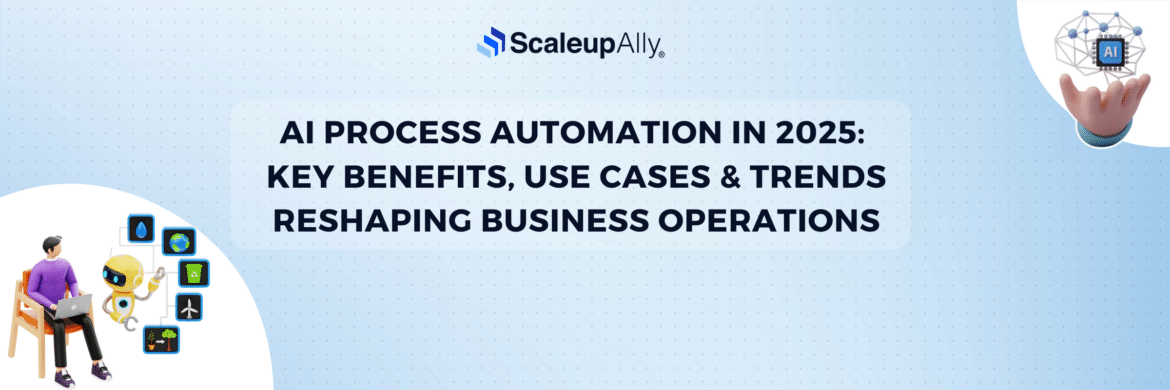
AI Process Automation in 2025: Key Benefits, Use Cases & Trends Reshaping Business Operations
Explore what AI process automation is, its key benefits, real-world use cases, latest trends, top tools, and how to implement it in your business.
Manu Jain
Jun 28 ,
16 min read
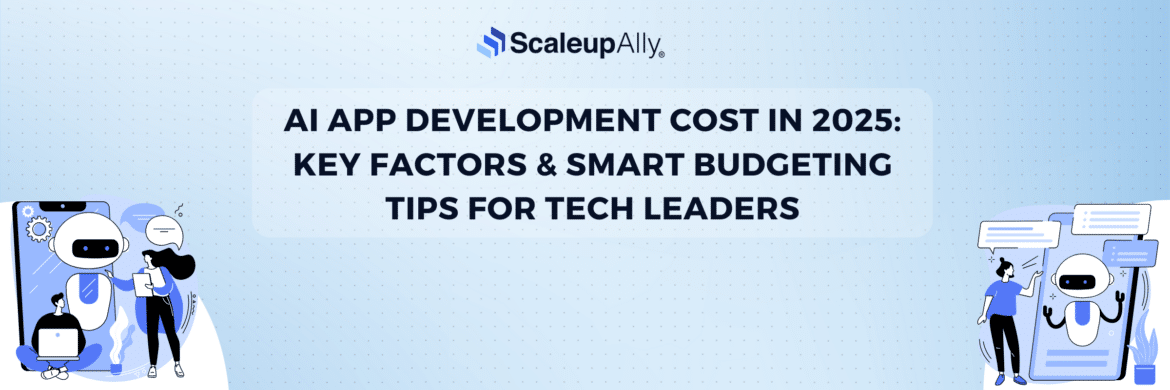
AI App Development Cost in 2025: Key Factors & Smart Budgeting Tips for Tech Leaders
Discover the true AI app development cost in 2025, key cost factors, use-case pricing, real examples & tips to reduce your AI project budget.
Manu Jain
Jun 28 ,
11 min read
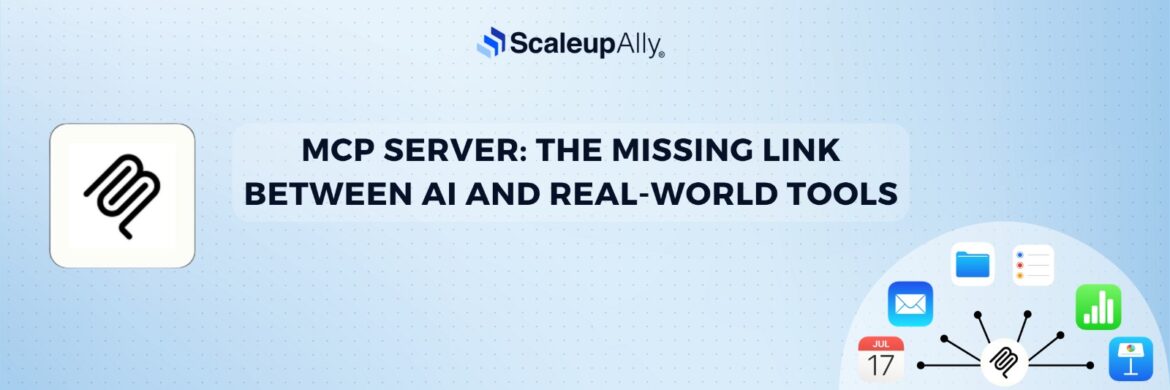
MCP Server: The Missing Link Between AI and Real-World Tools
Learn what MCP is, how it bridges AI models with tools and explore its architecture, applications and future innovations for enterprise AI integration.
ScaleupAlly Team
Jun 3 ,
14 min read








